
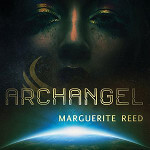 Archangel (Book One of the Chronicles of Ubastis)
Archangel (Book One of the Chronicles of Ubastis)
By Marguerite Reed; Narrated by Dina Pearlman
Audible Studios via Resurrection House
Release date: 17 June 2015
[UNABRIDGED] – 11 hours, 5 minutes
Themes: / military sci-fi / grief / humanity /
Publisher summary:
The Earth is dying, and our hopes are pinned on Ubastis, an untamed paradise at the edge of colonized space. But such an influx of people threatens the planet’s unstudied ecosystem – a tenuous research colony must complete its analysis, lest humanity abandon one planet only to die on another.
The Ubasti colonists barely get by on their own. To acquire the tools they need, they are relegated to selling whatever they can to outside investors. For xenobiologist Vashti Loren, this means bringing Offworlders on safari to hunt the specimens she and her fellow biologists so desperately need to study.
Haunted by the violent death of her husband, the heroic and celebrated Lasse Undset, Vashti must balance the needs of Ubastis against the swelling crush of settlers. Vashti struggles in her role as one of the few colonists licensed to carry deadly weapons, just as she struggles with her history of using them. And when she discovers a genetically engineered soldier smuggled onto the surface, Vashti must face the nightmare of her husband’s murder all over again. Standing at the threshold of humanity’s greatest hope, she alone understands the darkness of guarding paradise.
I spent a lot of my time while listening to this book confused, which made it all the more surprising when I realized at the end that I’d liked the book, and am fairly intrigued about what will come next. A book spanning multiple topics/thoughts, it was interesting to see how the various topics mostly worked together.
I think this book served in some ways as world-building/scene-setting for future books, which may explain why I was confused at times. This may be seen as a negative, but since I liked the world, it was okay, once I realized that I hadn’t missed anything with the plot (though at times, I was convinced that I had). I also liked the main character, a researcher on the planet of Ubastis but also one of the one people on the planet with a literal license to kill…anything. So while it seemed that the plot may have moved slowly, or that I was sure I was missing things, in the end it worked out okay for me. But others, especially those who listen, might have similar confusion.
It’s hard to describe what the book is “about” since Archangel covers so many topics. The book is set sometime in the future after the Earth has been effectively destroyed/overused by humans. Humans seem to have escaped to space, though it’s not clear that they had to go far to find other places to live. The book mentions a station at L5, which I presume is the L5 Lagrange point that people who’ve studied physics/astrophysics and sci-fi lovers alike will probably recognize. L5 has long been thought of as a place where space colonization might be feasible, so it seems as if it fits and that it’s not some L5 in relation to the world in the book, separate from our own system. Many humans seem to live in space, while a small handful live on Ubastis. Ubastis is a planet that has seen small waves of colonists; the first two waves of colonists were trained primarily as a military would be trained, though the job was to scout areas of the planet and start setup for more colonists in the future, to establish it as its own world. The other aspect of the colonists’ life is to study the planet and understand the resources it has and the balance between the natural ecosystem and those resources–the colonists do not wish to make Ubastis into another Earth, and so immigration to the planet is heavily controlled, only up for discussion once every 10 years. Archangel takes place just prior to one of these votes, and there is a heavy contingent of “off-worlders” lobbying for the strict limits to be lifted, to open immigration to the planet. In the book, human engineering is also not only possibly but heavily used, and most people have some level of genetic modification; most to dull aggression and many for vanity reasons.
The main character, Dr/Commander Lauren Vashti, is a “natural,” a non-genetically modified human. She was one of the people in the second group of colonists to come to the planet. Her husband was one of the leaders of that second group, and the pair are seen in many ways as a literal mother and father (and in the case of her husband, even a saint) of the planet and its resources. Vashti’s husband was killed by a highly-engineered “assault human,” a BEAST, one who was specifically genetically modified to be a soldier of sorts. This brings me to the first of the interleaved topics that the book touches on–motherhood and, to some extent, single motherhood. Vashti spends much of the book seemingly at odds with her dual role on the world. She has a literal daughter, a toddler, but often sees that being a literal mother is incompatible with being a leader, a voice for the planet as a whole. Because of her natural gifts as well as the reverence given to her, Vashti is also a literal mother to many Ubastians (and off-worlders?), as her eggs were frozen and used to create other offspring. There were striking scenes in the book where Vashti’s grief/memories of her husband are interrupted by her daughter, perfectly capturing the issues with motherhood. Later in the book, as she realizes that she is in some way a mother to the planet, similar memories are jarringly interrupted by the politics of the planet, things she must stand up for.
Obviously, another topic in the book is that of genetic engineering and the…sense…in doing so. I won’t go into details, but Vashti being a “natural” woman actually has a fairly important aspect in the plot. In particular, it seems that BEASTs can only really be “controlled” by natural humans, those without genetic modifications. This speaks volumes to the topic of genetic modification in general, but the topic is also touched upon by human nature. Because Vashti is a “natural,” she has a “normal” level of aggression/willingness to kill. It seems that many people have that particular knob turned down. Vashti is looked down upon by outsiders because she is in fact willing to kill to study the fauna native to Ubastis and willing to kill in self defense. It seems that most others find killing repugnant in general, something to be psychologically educated-away/re-educated away. The people of Ubastis (and also the off-worlders, I believe) are vegetarian. In fact, many are Muslim, though it was never really clear to me why it was important that so many were Muslim (the rest seemed to be Christian of some sort).
Another topic commonly dealt with in science fiction is that of resource use/protection of a planet/avoiding a runaway situation like we have on Earth/that eventually dooms Earth in many books…this book is no different. In her role as scientist and “mother” on Ubastis, Vashti preaches for conservation and minimization of the human footprint on the planet. The Earth is looked to as a sign of the worst that can happen.
In all, Archangel is a book about revolution. There are many types of revolution in the story, both personal revolution for Vashti, but other aspects of revolution, too. Once I came to terms with being “confused” every now and then, it was actually a fun read. The narrator, Dina Pearlman, is one whose name is familiar but I can’t find any other books that I’ve listened to that she’s narrated. Her narration had an odd cadence that was particularly difficult to follow at first. I found speeding up the audio playback helped that significantly, though her pacing may also have contributed to my confusion at times. Once I got “used” to it (at the faster playback speed), I got more into the book, but it did take awhile.
This book might not be for everybody–and certainly might not be for everybody in audio form–but as for me, I’m looking forward to seeing what happens next on Ubastis.
Posted by terpkristin.
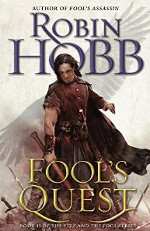 Fool’s Quest (Fitz and the Fool #2)
Fool’s Quest (Fitz and the Fool #2)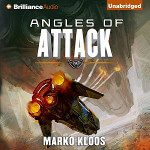 Angles of Attack (Frontlines #3)
Angles of Attack (Frontlines #3)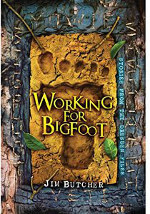 Working for Bigfoot: Stories from the Dresden Files
Working for Bigfoot: Stories from the Dresden Files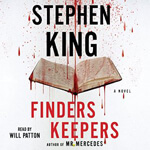 Finders Keepers (Bill Hodges Trilogy #2)
Finders Keepers (Bill Hodges Trilogy #2) The Martian
The Martian